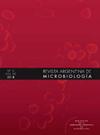Development of an enzyme-linked immunosorbent assay for detection of antibodies against infectious bursal disease virus based on a version of the recombinant viral protein 2
IF 2.1
4区 生物学
Q4 MICROBIOLOGY
引用次数: 0
Abstract
Infectious bursal disease virus (IBDV) is the etiological agent of a highly contagious and immunosuppressive disease in chickens. In poultry farms, the level of anti-IBDV antibodies of numerous serum samples must be monitored using fast and simple methodologies. Therefore, the aim of this study was to develop an enzyme-linked immunosorbent assay (ELISA), in an indirect format, using a version of mature viral protein 2 (VP2) of IBDV as coating agent. This recombinant fusion protein (His-VP2) was expressed at high levels in Escherichia coli. Bacterial inclusion bodies containing His-VP2 were successfully recovered using a simple, inexpensive and efficient method, a further purification of recombinant protein by affinity chromatography using immobilized metal chelates being unnecessary. After the VP2-ELISA was optimized, its performance was evaluated using preanalyzed sera from uninfected specific pathogen-free chickens and broilers vaccinated against IBDV in poultry farms, using a commercial ELISA kit. Based on these results, the developed assay proved to be sensitive, specific and in high agreement with the kit available on the market. In addition, the in-house ELISA demonstrated to be reproducible by intra-assay and inter-assay variability studies. In conclusion, VP2-ELISA could be an efficient and low-cost alternative diagnostic method to detect antibodies to IBDV in the poultry industry.
基于重组病毒蛋白2的酶联免疫吸附法检测传染性法氏囊病病毒抗体的建立
传染性法氏囊病病毒(IBDV)是鸡传染性和免疫抑制性疾病的病原。在家禽养殖场,必须使用快速和简单的方法监测大量血清样本的抗ibdv抗体水平。因此,本研究的目的是建立一种间接形式的酶联免疫吸附试验(ELISA),使用IBDV的成熟病毒蛋白2 (VP2)作为包衣剂。该重组融合蛋白(His-VP2)在大肠杆菌中高水平表达。利用一种简单、廉价、高效的方法成功地回收了含有His-VP2的细菌包膜体,无需再使用固定化金属螯合物亲和层析纯化重组蛋白。优化后的vp2酶联免疫吸附试验,采用预分析的未感染特异性无病原体鸡和家禽养殖场接种IBDV疫苗的肉鸡血清,使用商用酶联免疫吸附测定试剂盒对其性能进行评价。基于这些结果,开发的检测方法被证明是敏感的,特异性的,并且与市场上可用的试剂盒高度一致。此外,内部ELISA通过测定内和测定间的变异性研究证明是可重复的。由此可见,VP2-ELISA可作为一种高效、低成本的IBDV抗体检测方法。
本文章由计算机程序翻译,如有差异,请以英文原文为准。
求助全文
约1分钟内获得全文
求助全文
来源期刊

Revista Argentina de microbiologia
MICROBIOLOGY-
CiteScore
3.30
自引率
0.00%
发文量
46
审稿时长
>12 weeks
期刊介绍:
La Revista Argentina de Microbiología es una publicación trimestral editada por la Asociación Argentina de Microbiología y destinada a la difusión de trabajos científicos en las distintas áreas de la Microbiología. La Asociación Argentina de Microbiología se reserva los derechos de propiedad y reproducción del material aceptado y publicado.
 求助内容:
求助内容: 应助结果提醒方式:
应助结果提醒方式:


